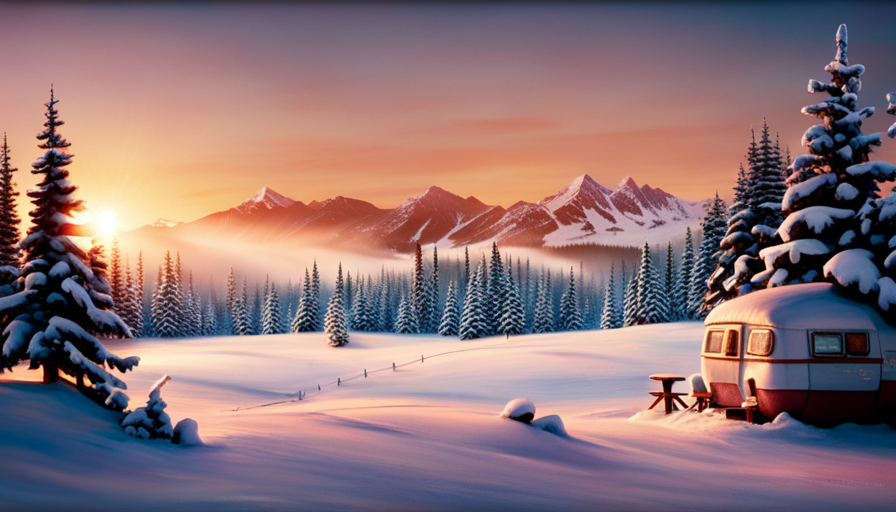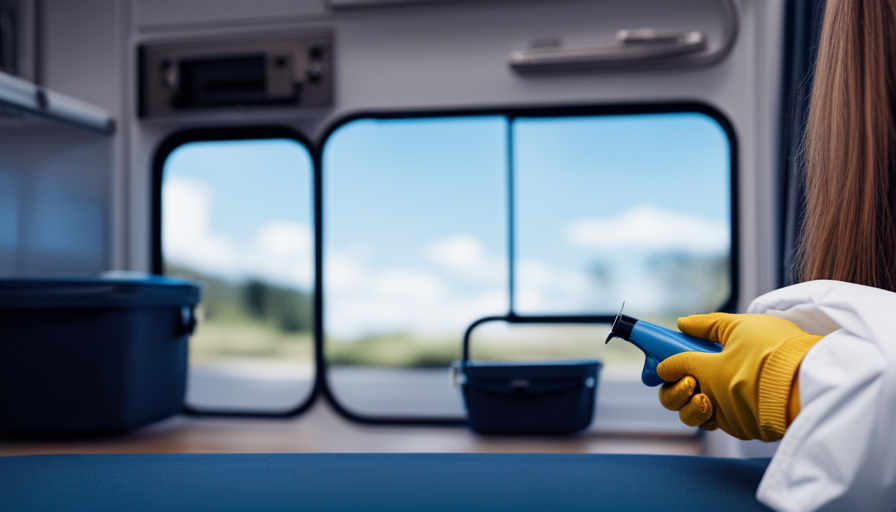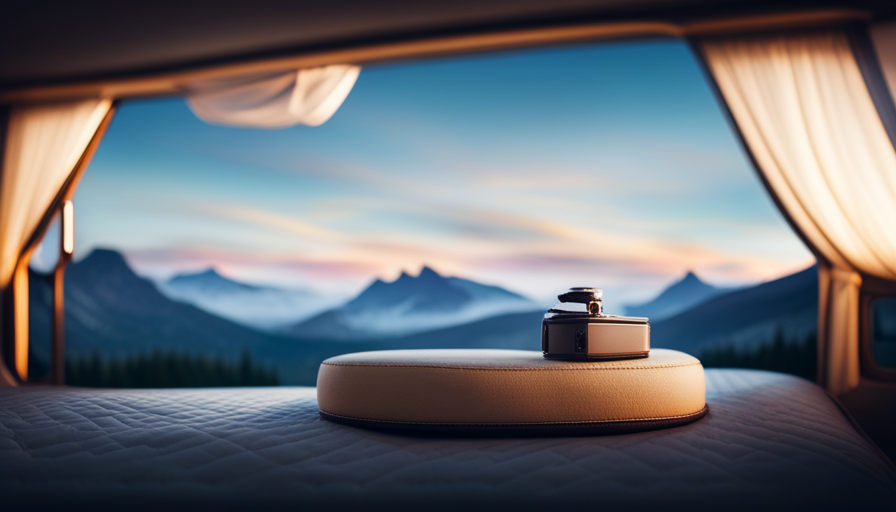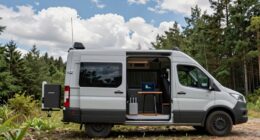Living in a camper during the winter may seem daunting, but with the right preparation and mindset, it can become an enjoyable adventure. From personal experience, I’ve discovered that embracing the winter season and making necessary adjustments can turn your camper into a cozy retreat.
In this guide, I’ll share my experience and offer practical tips on how to live in a camper during the winter months.
First and foremost, it’s essential to prepare your camper for the harsh winter conditions. From insulating your windows to sealing any drafts, these simple steps will help keep the cold out and the warmth in. Additionally, choosing the right heating system is crucial to ensure a cozy living space. Whether it’s a propane heater or a wood-burning stove, finding the most efficient and safe option is vital.
Stocking up on winter essentials, such as warm blankets, thermal curtains, and insulated clothing, is another crucial step. By staying connected to utilities and planning for winter activities and entertainment, you can make the most of your winter camping experience.
Furthermore, managing condensation and moisture, being prepared for power outages, and staying organized and efficient are essential aspects to consider.
So, grab a cup of hot cocoa, bundle up, and get ready to embrace the magic of winter in your camper. With the right preparation and a sense of adventure, living in a camper during the winter can be an unforgettable experience. Let’s dive in and discover how to make the most of this unique lifestyle choice.
Key Takeaways
- Proper insulation and sealing to keep the cold out and warmth in
- Choosing the right heating system for efficient and cost-effective heating
- Stocking up on winter essentials such as warm blankets and insulated clothing
- Staying connected to utilities, maintaining a reliable internet connection, and planning for winter activities
Prepare Your Camper for Winter Conditions
Get ready to cozy up in your camper this winter by taking the necessary steps to prepare it for the cold weather conditions. One of the most important aspects of winterizing your camper is ensuring proper insulation. Cold drafts can make your camper uncomfortable and even cause damage to pipes and other interior components.
To insulate your camper, you can use foam insulation panels, weatherstripping, and window insulation film. These materials help to keep the cold air out and the warm air in, making your camper a cozy retreat even in the coldest temperatures.
In addition to insulation, it’s crucial to be prepared for winter driving conditions. Before hitting the road, make sure your tires are properly inflated and have enough tread to provide traction on icy roads. You should also carry tire chains in case you encounter deep snow or ice. It’s a good idea to practice driving your camper in winter conditions in a safe and controlled environment, such as an empty parking lot, to get a feel for how it handles in different situations.
Now that your camper is prepared for winter conditions, let’s move on to choosing the right heating system.
Choose the Right Heating System
Finding the perfect heating system for your cozy home on wheels during the colder months is essential to ensure a comfortable and enjoyable experience. When choosing the right heating system for your camper, it’s important to consider both efficiency and cost. Look for systems that are energy-efficient and can effectively heat your space without consuming excessive fuel or electricity. This will not only keep you warm but also help save on heating costs.
There are various alternative heating options to consider for your camper. One popular choice is a propane heater, which is efficient and easy to use. It provides a steady source of heat and can be easily regulated to maintain a comfortable temperature. Another option is a wood-burning stove, which not only provides warmth but also adds a cozy ambiance to your camper. However, it’s essential to ensure proper ventilation and safety precautions when using a wood-burning stove.
Choosing the right heating system for your camper involves considering efficiency, cost, and alternative options. With the right heating system in place, you can enjoy a cozy and warm living space during the winter months. Now that you have your heating system sorted, let’s move on to the next step: stocking up on winter essentials.
Stock Up on Winter Essentials
Now that you’ve got the perfect heating system in place, it’s time to stock up on all the winter must-haves to ensure a cozy and comfortable season in your home on wheels. Living in a camper during the winter months can be challenging, but with the right preparation, you can enjoy the beauty of the season without any worries.
Here are some essential items you’ll need to brave the cold:
-
Winter clothing: Invest in warm and insulating clothing such as thermal underwear, thick socks, hats, gloves, and a heavy-duty winter coat. Layering is key to staying warm, so make sure to have plenty of options.
-
Winter food supply: Stock your pantry with non-perishable food items that can sustain you during winter storms. Canned goods, dried fruits, nuts, and energy bars are great options. Don’t forget to have plenty of hot beverages like tea and coffee to warm you up on chilly days.
-
Portable propane heater: In addition to your heating system, having a portable propane heater is a good backup option. It can provide extra warmth when needed and is especially useful during power outages.
-
Insulated curtains or window coverings: To prevent drafts and keep the heat inside, invest in insulated curtains or window coverings. They will help retain heat and make your living space more comfortable.
By stocking up on winter essentials like clothing and food supplies, you’ll be well-prepared to face the colder months in your camper. Now, let’s explore how to stay connected to utilities and ensure a smooth winter season.
Stay Connected to Utilities
When living in a camper during the winter, it’s important to ensure access to electricity. This will keep you warm and provide power for your appliances.
Managing your water supply and plumbing is crucial. It will prevent freezing and ensure you have access to clean water.
Staying connected to the internet and phone service is also essential. This will keep you connected to the outside world and allow you to stay in touch with loved ones.
Ensure Access to Electricity
To ensure access to electricity while living in a camper during winter, it’s imperative to have a reliable power source. Electricity management becomes crucial in cold weather, as it not only powers our daily essentials but also keeps us warm.
One option is to invest in portable generators, which can provide a steady power supply. Make sure to choose a generator that’s suitable for winter conditions and has enough wattage to run your appliances and heating systems.
Another option is to utilize solar panels, which can be mounted on the roof of the camper. They harness the power of the sun to generate electricity, and with proper installation, they can provide a sustainable and eco-friendly winter power supply.
By choosing the right power source, you can ensure a comfortable living experience in your camper during the winter months.
Speaking of comfort, managing water supply and plumbing is equally important to sustain a cozy winter lifestyle.
Manage Water Supply and Plumbing
Managing the water supply and plumbing in a camper during the winter months can be challenging, but with proper maintenance and insulation, you can avoid freezing pipes and ensure a smooth flow of water. Insulating your pipes is crucial to prevent freezing. Use foam pipe insulation or heat tape to protect exposed pipes from the cold. Additionally, insulate the water tank and any other vulnerable areas. To further prevent freezing, consider using heated water hoses or wrapping regular hoses with heat tape. It’s also important to keep the camper’s interior warm and well-insulated to maintain a consistent temperature. Regularly check for any leaks or cracks in the plumbing system and promptly repair them. By taking these precautions, you can enjoy a reliable water supply throughout the winter in your camper. Now, let’s move on to the next section and learn how to stay connected to the internet and phone service.
Stay Connected to the Internet and Phone Service
Staying connected to the internet and phone service in your camper during the winter is absolutely essential for maintaining a sense of normalcy and avoiding any potential isolation. As someone who embraces the remote work options and digital nomad lifestyle, having a reliable internet connection and phone service is crucial. Thankfully, there are a few ways to ensure you stay connected even in the coldest months.
Investing in a quality mobile hotspot or a satellite internet system can provide you with a stable internet connection wherever you go. Additionally, you can boost your phone signal with a signal booster or use a Wi-Fi extender to enhance your internet coverage. By prioritizing your connectivity needs, you can continue to work remotely and stay in touch with loved ones, all while enjoying the freedom of living in a camper during the winter.
Now, let’s move on to how you can plan for winter activities and entertainment.
Plan for Winter Activities and Entertainment
Bundle up in your warmest clothes and get ready for a winter wonderland of activities and entertainment in your camper. Winter doesn’t mean you have to stay cooped up inside; there are plenty of winter sports and cozy indoor activities to keep you entertained. Whether you’re a fan of skiing, snowboarding, or ice skating, there are many winter sports options available to you. Hit the slopes at nearby ski resorts or find a frozen lake for some ice skating fun. If you prefer staying indoors, you can curl up by the fireplace with a good book or watch your favorite movies on a snowy day. Don’t forget to bring board games or puzzles to challenge your mind and keep you entertained. To help you plan your winter activities, here’s a table with some ideas:
| Winter Sports | Cozy Indoor Activities |
|---|---|
| Skiing | Reading a book |
| Snowboarding | Watching movies |
| Ice Skating | Playing board games |
| Snowshoeing | Completing puzzles |
| Sledding | Crafting |
Now that you have plenty of ideas for winter activities and entertainment, it’s time to think about staying safe on the road during this season.
Stay Safe on the Road
Driving during the winter season can be challenging and potentially dangerous, as statistics show that icy roads contribute to over 1,300 fatal car crashes each year in the United States. To stay safe on the road and avoid becoming a part of these grim statistics, it’s crucial to follow some essential winter driving tips.
First and foremost, ensure that your vehicle is well-maintained, with properly inflated tires and working brakes.
Additionally, it’s important to drive at a slower speed, allowing for more time to react to any unexpected situations. Always keep a safe distance from the vehicle in front of you, as it takes longer to stop on icy roads.
Another crucial tip is to avoid sudden movements, such as harsh braking or acceleration, as this can cause your vehicle to lose traction.
Lastly, be prepared for emergencies by keeping a winter survival kit in your camper, including items such as a shovel, blankets, food, and water.
By following these tips, you can significantly reduce the risk of accidents and stay safe on the road.
Now, let’s explore how to manage condensation and moisture in your camper.
Manage Condensation and Moisture
To effectively control condensation and moisture, it’s imperative to employ proper ventilation techniques inside your recreational vehicle. Here are some tips to prevent mold and manage condensation during the winter months:
-
Use dehumidifiers: Invest in a good quality dehumidifier to reduce the moisture levels inside your camper. This will help prevent condensation on windows and walls.
-
Insulate your camper: Proper insulation is crucial to keep the cold air out and the warm air in. Insulate windows, doors, and any other areas where drafts may occur. This will not only help with condensation but also improve energy efficiency.
-
Use moisture-absorbing materials: Place moisture-absorbing materials, such as silica gel packs or desiccant bags, in areas prone to moisture buildup. These materials will help absorb excess moisture and prevent mold growth.
-
Ventilate regularly: Open windows or roof vents for a few minutes each day to allow fresh air to circulate. This will help remove excess moisture and prevent condensation.
By following these insulation tips and employing proper ventilation techniques, you can effectively manage condensation and prevent mold growth in your camper during the winter months.
As we move on to the next section about being prepared for power outages, it’s important to consider alternative heating options to stay warm in case of a power failure.
Be Prepared for Power Outages
When living in a camper during winter, it’s crucial to be prepared for power outages. Having backup power sources, such as a generator or solar panels, ensures that you won’t be left in the dark.
Additionally, using energy-efficient appliances and minimizing power usage can help prolong the lifespan of your batteries and keep you comfortable even during extended periods without electricity.
Have Backup Power Sources
Make sure you’ve got backup power sources in your camper during the winter, like a generator or solar panels, so you won’t be left in the cold and dark like a snow-covered cabin in the middle of nowhere. When it comes to winter camping, having reliable backup power options is crucial. With the potential for power outages due to extreme weather conditions, you need to be prepared. A backup generator can provide electricity when the main power source fails, ensuring you stay warm and have access to essential appliances. Alternatively, solar panels can harness the power of the sun to keep your camper running smoothly. To help you understand the benefits of these backup power sources, take a look at the table below:
| Backup Power Source | Advantages |
|---|---|
| Generator | – Provides immediate power backup |
- Runs on fuel
- Suitable for extended power outages | | Solar Panels | – Harnesses renewable energy
- Environmentally friendly
- Low maintenance |
Having backup power sources in your camper ensures you’re prepared for any power outage that comes your way. Now, let’s discuss the importance of using energy-efficient appliances to maximize your power usage.
Use Energy-Efficient Appliances
Using energy-efficient appliances in your rig during the colder months will help you conserve power and keep your space cozy.
When living in a camper during winter, it’s crucial to find ways to save energy and stay warm without draining your power source. One of the best strategies is to invest in energy-saving appliances. Look for appliances with high energy-efficiency ratings, such as refrigerators, heaters, and stoves. These appliances are designed to use less energy while still providing the same level of functionality.
Additionally, consider using LED lights, which consume less power than traditional incandescent bulbs. By incorporating these energy-saving tips and using efficient appliances, you can significantly reduce your power usage and ensure a comfortable living environment in your camper during the winter months.
Transitioning into the next section, let’s explore how to further minimize power usage.
Minimize Power Usage
To minimize power usage, you can start by unplugging unnecessary devices and turning off lights when not in use. This simple habit can save a significant amount of energy and reduce your electricity bill. Additionally, investing in energy-efficient appliances can make a big difference in your camper’s power consumption. Look for appliances with high Energy Star ratings and consider replacing old, inefficient models. Another way to save power in the winter is by implementing effective insulation techniques. Adding weatherstripping to windows and doors, using insulating curtains, and sealing any gaps or cracks will help keep the cold air out and the warmth in. By following these energy-saving tips and winter insulation techniques, you can stay comfortable and conserve power in your camper during the colder months. Now, let’s explore how to stay organized and efficient in your winter camper living.
Stay Organized and Efficient
When living in a camper, staying organized and efficient is key to maximizing your space and keeping things running smoothly. One way to do this is by maximizing storage space, utilizing every nook and cranny to store your belongings.
Developing a cleaning routine is also essential, as it helps to keep your camper tidy and clutter-free.
Lastly, optimizing your camper layout can make a huge difference in how efficiently you can move around and access everything you need. By implementing these strategies, you’ll be able to make the most of your camper living experience.
Maximize Storage Space
One effective way to maximize storage space in a camper during winter is by utilizing clever organization techniques and making use of multifunctional furniture. Here are three ways to make the most of your storage space:
-
Utilize vertical space: Install shelves or hanging organizers on the walls to store items like clothing, kitchen utensils, and toiletries. This not only saves valuable floor space but also keeps everything within easy reach.
-
Opt for collapsible and stackable containers: Invest in storage containers that can be collapsed or stacked when not in use. This way, you can easily store them away when you don’t need them and create more space for other items.
-
Use hidden storage compartments: Look for furniture pieces that double as storage, such as ottomans with hidden compartments or beds with built-in drawers. These hidden storage solutions help keep your belongings organized and out of sight.
By maximizing your storage space with these techniques, you can create a more organized and efficient living environment in your camper during winter. As you develop a cleaning routine, you’ll find it easier to maintain a clutter-free space.
Develop a Cleaning Routine
Get ready to transform your cleaning routine into a supercharged, dirt-busting frenzy that will leave your cozy mobile abode sparkling like a winter wonderland. Developing a cleaning routine is crucial for winter maintenance in your camper. With the limited space, it’s important to stay organized and keep things tidy. To help you stay on track, I’ve created a simple cleaning schedule using the 2 column and 4 row table below:
| Day | Task |
|---|---|
| Monday | Vacuum and mop the floors |
| Tuesday | Dust and wipe surfaces |
| Wednesday | Clean the bathroom |
| Thursday | Organize and declutter |
By following this routine, you’ll ensure that every corner of your camper gets the attention it needs. Now, let’s move on to optimizing your camper layout without sacrificing comfort.
Optimize Your Camper Layout
Revamp your cozy mobile abode by optimizing its layout to create a comfortable and inviting space that’ll make you feel right at home.
When living in a camper during winter, it’s essential to optimize camper insulation and create a cozy sleeping area to stay warm and snug. Start by insulating windows and doors with thermal curtains or window film to prevent heat loss. Utilize rugs and blankets to cover cold surfaces and add extra insulation.
Rearrange furniture to maximize space and create a functional layout that suits your needs. Consider investing in a heated mattress pad or electric blanket for a toasty night’s sleep.
By optimizing your camper layout, you’ll transform it into a winter haven.
Now, let’s dive into how to enjoy the winter wonderland surrounding your cozy camper.
Enjoy the Winter Wonderland
To fully embrace the winter season while living in a camper, it’s essential to appreciate the majestic beauty of snow-covered landscapes. Did you know that approximately 12% of the Earth’s land surface is covered in snow during the winter months? It’s a magical sight that transforms ordinary surroundings into a winter wonderland.
As someone who loves winter sports, I couldn’t be more thrilled to have the opportunity to live in a camper and experience the snowy paradise firsthand. One of the perks of living in a camper during winter is the easy access to winter sports. Whether it’s skiing, snowboarding, or ice skating, there are endless opportunities to enjoy the great outdoors. With the right gear and a sense of adventure, every day can be a new and exciting experience.
But when the cold weather becomes too much, it’s important to have a cozy interior to retreat to. Investing in insulation, heating systems, and warm bedding can make all the difference in creating a comfortable living space. Snuggling up with a hot cup of cocoa, surrounded by the soft glow of twinkling lights, is the epitome of winter coziness.
Living in a camper during winter doesn’t mean sacrificing comfort or missing out on the joys of the season. With the right mindset and a few adjustments, you can fully enjoy the winter wonderland while still having a cozy and inviting home on wheels.
Frequently Asked Questions
How do I insulate the windows of my camper for winter?
To insulate the windows of my camper for winter, I use a variety of insulating materials and DIY window coverings. I start by applying weatherstripping around the edges of the windows to prevent drafts.
Then, I attach thermal curtains or blinds to the windows to create an extra layer of insulation. For added insulation, I also use bubble wrap or reflective window film.
These simple and cost-effective solutions help keep the cold air out and the warmth in during winter.
What are some tips for preventing frozen pipes in my camper during winter?
To prevent frozen pipes in my camper during winter, I’ve found a few helpful tips.
Firstly, it’s important to prevent condensation buildup by properly ventilating the space and using dehumidifiers if needed.
Secondly, choosing the right insulation materials can make a big difference. I recommend using foam pipe insulation to wrap around exposed pipes and insulating the walls with fiberglass or spray foam insulation.
These steps will help keep your pipes from freezing and ensure a comfortable winter in your camper.
Is it safe to use a propane heater in my camper during winter?
Using a propane heater in your camper during winter can be safe if you take the right precautions. However, it’s important to note that propane heaters are responsible for over 25% of RV fires. To minimize the risk, consider alternatives like electric heaters or ceramic space heaters.
Additionally, make sure to have a carbon monoxide detector in your camper, properly ventilate the space, and never leave the heater unattended. Safety should be your top priority when heating your winter camper.
How do I properly store and maintain my winter gear in a small camper space?
To properly store and maintain my winter gear in my small camper space, I prioritize organization. I use storage bins to keep my winter clothing neatly packed and easily accessible.
I find that vacuum-sealed bags are great for maximizing space and protecting my gear from moisture.
I also hang hooks or use over-the-door organizers to hold hats, scarves, and gloves.
By keeping everything organized, I can make the most of my limited space and ensure that my winter gear stays in good condition throughout the season.
Are there any specific camping spots or parks that are better suited for winter camping in a camper?
Well, let me tell you, there are some camping spots out there that are practically made for winter camping in a camper.
Picture this: snow-covered mountains, cozy campsites, and the perfect balance of adventure and relaxation.
When it comes to winter camping essentials, you’ll want to pack some seriously warm gear. Think insulated sleeping bags, thick blankets, and a trusty portable heater. And don’t forget the best winter camping gear: hot cocoa and marshmallows for those chilly nights by the campfire.
Are the Tips for Living in a Camper in Winter the Same for All Campers?
Living in a camper during winter brings with it a unique set of challenges. However, the tips for staying warm and comfortable may vary depending on the type of camper. Motorhomes typically offer more insulation and heating options, making it easier to adapt to colder temperatures. On the other hand, pop-up campers or travel trailers might require additional measures like skirt insulation and propane heaters. Ultimately, the specific tips for living in a camper during winter may differ based on the type and features of the camper.
What Are the Best Ways to Live in a Camper in Winter Without Winterizing It?
Living in a camper in winter without winterizing your camper cost can be challenging, but there are ways to stay comfortable. Use insulation, space heaters, and heated blankets to keep warm. Keep water running to prevent freezing, and park in a sheltered area to block the wind.
Conclusion
So there you have it, my friends! Living in a camper during winter may seem like a challenge, but with the right preparations and a positive mindset, it can actually be quite an adventure.
Embrace the beauty of the winter wonderland around you, stay warm and cozy with the perfect heating system, and stock up on all the essentials you’ll need. Don’t forget to plan for some fun winter activities and stay connected to utilities. And remember, when those power outages hit, just think of it as an opportunity to disconnect and enjoy the simple pleasures of life.
Stay organized and efficient, manage condensation and moisture, and most importantly, enjoy every moment of this unique experience. Happy camping, my fellow winter wanderers!










